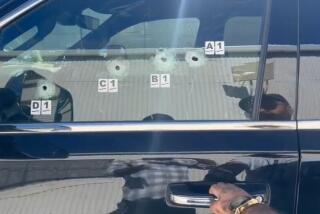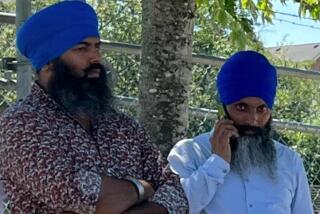For Muslims in India, an uneasy calm
The Muslims of terror-plagued Mumbai know the drill.
First there is bloodshed. Then come the whispers, the accusing stares, the scarcely veiled hostility.
“They are going to say that all Muslims do this,” restaurateur Naved Akhtar Mirza said, after gunmen, apparently Islamic extremists, stormed India’s financial capital last month, shooting up a train station and killing hostages at two hotels and a Jewish center.
To their relief, no violence against Muslims has erupted, despite simmering tensions and several previous episodes of sectarian strife. Community leaders hope that a grudging sense of tolerance, if not harmony, will continue to prevail in the aftermath of the 60 hours of mayhem in which more than 170 people died.
But the uneasy peace masks the fact that India’s 150 million Muslims -- about as many as live in neighboring Pakistan -- are often branded a fifth column and looked on with distrust and even disgust in this Hindu-majority country. Many live a marginalized existence in poverty-stricken ghettos, uneducated, unable to find work and sometimes abused or unfairly arrested by police, giving rise to resentment that observers warn could be exploited by radical groups.
Last weekend, Prime Minister Manmohan Singh warned bluntly of “an unacceptable rise in intolerance” that he said has made India “more divided, more angry and, tragically, more violent.”
Seeking to keep a lid on any backlash, Singh declared that “it is the fundamental right of all to follow their religion, practice their culture and hold to their views. . . . It is nobody’s right to deny anyone this right or to dictate faith and opinions to others.”
Many Muslims in India, afraid of being cast as unpatriotic or even traitorous, have gone the extra mile to prove themselves loyal to their country as well as their faith.
In Mumbai, that translated into a refusal by clerics to allow the gunmen slain in the attacks to be given religious burials in a Muslim cemetery, on the grounds that the militants followed a perversion of Islam. Hundreds of people turned out for a Muslim march against extremism, waving banners proclaiming, “Our motherland’s enemies are our enemies.” Residents point out that one-fifth of the victims in the attacks, perhaps more, were Muslim.
“We are all Indians,” declared S.A. Sheif, who owns a small toy store in the shadow of one of Mumbai’s mosques. “I was born in Mumbai, as were my children. My father was born here. I will die here as well. Those who do this killing -- no religion teaches us to do this sort of thing.”
But Muslims know that a backlash remains possible, especially if investigators uncover a local Muslim link to the attacks. Two Muslim Indian men, one of whom was arrested this year carrying hand-drawn maps of some of the targeted sites, are in police custody.
Many of Mumbai’s Muslims still painfully recall the city’s bloody communal riots of December 1992 and January 1993, in which nearly 1,000 people, the majority of them Muslims, were killed. The riots were sparked by the demolition of a centuries-old mosque at the hands of Hindu zealots in the northern Indian town of Ayodhya.
In response to the riots, Muslim gangsters set off a series of bombs in Mumbai in March 1993 that killed more than 250 people, and thousands of residents of religiously mixed neighborhoods packed up and retreated to faith-based enclaves, sharpening the lines of segregation in the city.
“I don’t think Bombay has been the same since 1993,” said Pakistani defense analyst Nasim Zehra, using Mumbai’s former name. Sectarian tension is “always there, underground. I hope nothing happens, but we have to be prepared.”
That the antagonism has not boiled over into violence since last month’s attacks is a sign, optimists say, that Indian society has matured and learned from the religious convulsions of the past. After bombs exploded on crowded commuter trains in Mumbai in 2006, killing about 200 people in another attack blamed on Islamic militants, fears that the Muslim community as a whole would be made to suffer also did not materialize.
Muslims worship freely in India, where they account for about 14% of the population of 1.1 billion. The country’s most famous landmark, the milky-white Taj Mahal, incorporates a mosque where weekly prayers are still held, more than 350 years after it was built.
But many Muslims point out that persecution is not limited to physical violence, just as racism in the United States has often manifested itself in more subtle ways.
Two years ago, a high-level government commission on the status of India’s Muslims reported that members of the community were more likely to be illiterate than the Indian population as a whole. Muslim households tended to live in areas with less access to toilets, electricity and running water.
Reports of discrimination in employment and housing are routine, as are complaints of arbitrary arrests and police harassment.
Nine years ago, when Abdul Kareem moved from southern India to New Delhi, the capital, he was the only Muslim in a group of three friends looking for a place to live together.
The landlords at one suitable apartment were happy, at first, to be approached by three responsible young men who worked at the same company. “But when they asked my name and I said, ‘Abdul Kareem,’ you could see their expressions change. They said, ‘Well, you see, we’re really not interested in renting to a Muslim,’ ” said Kareem, 29.
G.H. Pasha, an officer at Allanasons, a Muslim-owned Mumbai trading house near one of the luxury hotels struck during the attacks, said he was hopeful that young Indians would increasingly free themselves of the prejudices held by their forebears.
“The younger generation realizes we have to work hand in hand if we want to bring the country up,” Pasha said. “Let’s hope for a better future.”
--
mark.magnier@latimes.com
More to Read
Sign up for Essential California
The most important California stories and recommendations in your inbox every morning.
You may occasionally receive promotional content from the Los Angeles Times.











